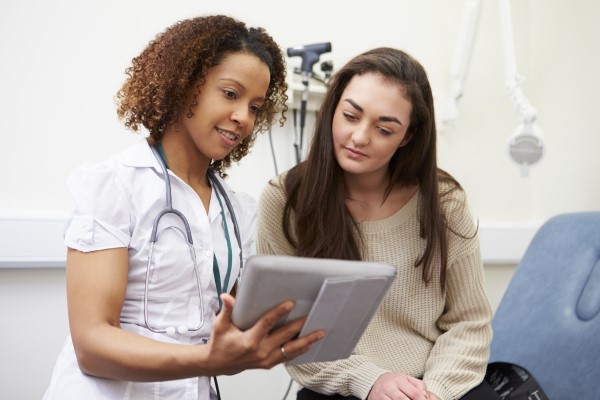Early Signs of Fibroids Every Woman Should Know

Uterine fibroids are a common but treatable condition. When detected early, OB-GYNs can manage them effectively before they cause more serious issues, such as prolonged discomfort or infertility. Learning about the earliest signs of fibroids and being able to recognize them makes this early detection and prompt treatment possible.
What are fibroids?
Fibroids, also called leiomyomas or myomas, are noncancerous growths that develop in or around the uterus. More specifically, fibroids consist of muscle and fibrous tissue. They can vary in size from small, undetectable masses to large benign tumors that distort the shape of the uterus. Therefore, although they are not cancerous, fibroids can still cause pain and discomfort, among other symptoms.
The National Institutes of Health (NIH) states that about 20 to 25% of patients assigned female at birth (AFAB) develop fibroids when they are of reproductive age. However, they are most common among patients in their 40s and 50s. The good news is that, per the NIH, three out of every four patients do not experience any problems as a result of their fibroids.
When fibroids are an issue and why early detection is important
Nevertheless, it is important to check for fibroids as soon as one develops symptoms that could indicate them. Not only does this prevent complications like infertility and miscarriage, but it also lowers the chances of needing invasive procedures like hysterectomies. For instance, noninvasive procedures for early-stage fibroids range from medicines that can shrink them to focused ultrasound surgery to destroy them with sound waves. An obstetrician and gynecologist (OB-GYN) can also discuss minimally invasive procedures like uterine artery embolization.
Early signs of fibroids
Recognizing the early signs of fibroids is crucial for timely intervention and effective management. Early signs of fibroids often affect menstruation and sexual activity. Common symptoms include:
- Heavy bleeding during menstruation
- A prolonged period, such as one that lasts over seven days
- Pelvic pain (pain in the lower back, stomach, buttocks, and genital area)
- Frequent urination and constipation
- Pain during intercourse
If these symptoms persist or worsen over time, seek medical evaluation from an OB-GYN. An ultrasound or pelvic exam can easily detect fibroids. If any are found, an OB-GYN can promptly treat the patient to help relieve symptoms.
Secondary issues related to fibroids
Fibroids can considerably affect quality of life. When they cause the symptoms described above, fibroids can disrupt daily life and activities, work, and social engagements. Pelvic pain is not only uncomfortable but can also make one feel irritable and fatigued. Further, pain during intercourse can be frustrating to the patient and may exacerbate pelvic pain. Other fibroid symptoms can trigger similar secondary issues, compounding the overall impact on health and well-being.
Prioritize your health with a consultation
At Donald Eckhardt Jr., M.D. , Kari Eckhardt W.H.N.P., C.N.M., we are here to help patients experiencing persistent symptoms that may be associated with fibroids. If you have noticed the early signs of fibroids or have a family history of fibroids and want to catch them before they cause symptoms, consult our team. We are here to help protect your health and well-being with prompt treatment. Call us for an appointment in our Tomball office.
Request an appointment here: https://eckhardtobgyn.com or call Donald Eckhardt Jr., M.D. , Kari Eckhardt W.H.N.P., C.N.M. at (281) 516-9441 for an appointment in our Tomball office.
Check out what others are saying about our services on Yelp: Fibroids in Tomball, TX.
Recent Posts
Getting ready to welcome a child into the world is one of life's most meaningful experiences. Many expectant parents today choose to work with a midwife for prenatal care and labor support because midwives focus on personalized, patient-centered care. A midwife is a trained healthcare professional who provides comprehensive services throughout pregnancy, birth, and postpartum recovery.A…
Menopause is a natural transition in a woman's life, typically occurring between the ages of 45 and 55. Women's health services help you manage menopause-related symptoms and challenges while supporting your overall well-being. While it is important to remember that menopause is a biological milestone, it can impact your cardiovascular health, bone density, and mental…
OBGYN, or an obstetrics and gynaecology doctor, visits support lifelong reproductive health, and the right questions turn short appointments into clear decisions. Preparation reduces anxiety and improves outcomes. This guide provides practical and respectful prompts for preventive care, pregnancy planning, and symptom evaluation. Shared decision-making grows stronger when patients engage with the OBGYN as a…
A gynecologist may suggest incontinence surgery when a patient's loss of bladder control is interfering with daily life. Urinary incontinence is relatively common in older adults, according to the Mayo Clinic, and it can be a normal symptom of aging. It is important to speak to a qualified gynecologist if the symptoms are becoming too…


